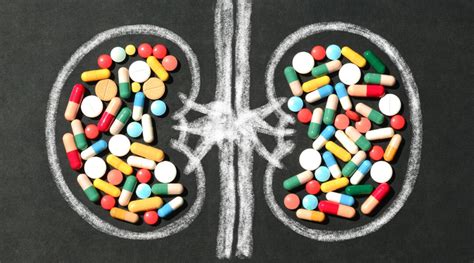Kidney Disease From Medications

The kidneys, two bean-shaped organs located in the lower back, play a crucial role in maintaining overall health by filtering waste and excess fluids from the blood. However, certain medications can cause kidney damage or exacerbate existing kidney disease. The risk of developing kidney disease from medications is a significant concern, as it can lead to chronic kidney disease (CKD) or even end-stage renal disease (ESRD), requiring dialysis or a kidney transplant.
Medications Linked to Kidney Damage
Several types of medications have been associated with kidney damage or disease, including:
- Nonsteroidal anti-inflammatory drugs (NSAIDs): Long-term use of NSAIDs, such as ibuprofen or naproxen, can reduce blood flow to the kidneys, leading to kidney damage or disease.
- Certain antibiotics: Antibiotics like aminoglycosides (e.g., gentamicin) can be toxic to the kidneys and cause damage or disease, especially with prolonged use or in high doses.
- Chemotherapy medications: Some chemotherapy agents, such as cisplatin, can cause kidney damage or disease due to their toxic effects on kidney cells.
- Proton pump inhibitors (PPIs): Long-term use of PPIs, such as omeprazole or lansoprazole, has been linked to an increased risk of kidney disease, although the exact mechanism is unclear.
- Lithium: This medication, commonly used to treat bipolar disorder, can cause kidney damage or disease, particularly with long-term use or at high doses.
Mechanisms of Kidney Damage
Medications can cause kidney damage through various mechanisms, including:
- Direct toxicity: Some medications can directly damage kidney cells, leading to inflammation and scarring.
- Reduced blood flow: Certain medications, such as NSAIDs, can reduce blood flow to the kidneys, decreasing their ability to filter waste and excess fluids.
- Increased oxidative stress: Some medications can increase oxidative stress in the kidneys, leading to inflammation and damage.
- Imbalanced electrolytes: Medications can disrupt electrolyte balances, leading to changes in kidney function and potentially causing damage.
Risk Factors for Medication-Induced Kidney Disease
Certain individuals are more susceptible to medication-induced kidney disease, including:
- Older adults: Older adults are more likely to experience kidney damage or disease due to age-related declines in kidney function.
- People with pre-existing kidney disease: Individuals with pre-existing kidney disease are more vulnerable to medication-induced kidney damage or disease.
- Those taking multiple medications: Taking multiple medications can increase the risk of kidney damage or disease due to cumulative effects.
- People with underlying medical conditions: Certain medical conditions, such as diabetes or hypertension, can increase the risk of kidney disease and make individuals more susceptible to medication-induced kidney damage.
Prevention and Management
To minimize the risk of medication-induced kidney disease, it is essential to:
- Monitor kidney function: Regularly monitoring kidney function can help detect potential kidney damage or disease early on.
- Use medications judiciously: Use medications only as directed and for the shortest duration possible to minimize the risk of kidney damage.
- Stay hydrated: Adequate hydration can help maintain healthy kidney function and reduce the risk of kidney damage.
- Manage underlying medical conditions: Effectively managing underlying medical conditions, such as diabetes or hypertension, can reduce the risk of kidney disease.
It is crucial to discuss medication use with your healthcare provider, especially if you have pre-existing kidney disease or are taking multiple medications. Your healthcare provider can help you weigh the benefits and risks of medications and adjust your treatment plan to minimize the risk of kidney damage or disease.
FAQ Section
Can all medications cause kidney damage?
+No, not all medications can cause kidney damage. However, certain medications, such as those listed above, have been associated with an increased risk of kidney disease or damage.
How can I protect my kidneys from medication-induced damage?
+To protect your kidneys from medication-induced damage, it is essential to use medications judiciously, stay hydrated, and manage underlying medical conditions. Regularly monitoring kidney function and discussing medication use with your healthcare provider can also help minimize the risk of kidney damage.
Can kidney damage from medications be reversed?
+In some cases, kidney damage from medications can be reversed or improved by stopping the offending medication, managing underlying medical conditions, and maintaining healthy kidney function through lifestyle modifications and medical treatment. However, the extent of reversibility depends on the severity and duration of kidney damage.
Conclusion
Medication-induced kidney disease is a significant concern, as certain medications can cause kidney damage or exacerbate existing kidney disease. By understanding the medications linked to kidney damage, mechanisms of kidney damage, and risk factors for medication-induced kidney disease, individuals can take steps to minimize their risk. Regularly monitoring kidney function, using medications judiciously, and managing underlying medical conditions can help prevent medication-induced kidney disease. If you have concerns about medication-induced kidney disease, it is essential to discuss your medication use with your healthcare provider to weigh the benefits and risks and adjust your treatment plan accordingly.


